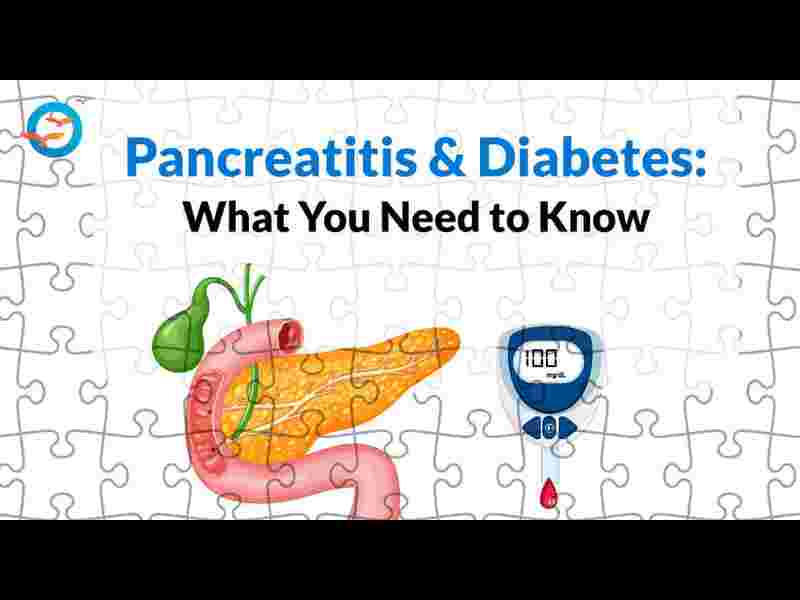Pancreatitis and Diabetes Link

Pancreatitis and Diabetes: How Are They Connected?
When we talk about pancreatitis and diabetes, many people feel confused about how these two conditions are linked. But the truth is, the pancreas plays a big role in both digestion and blood sugar control. So, when it gets inflamed or damaged, it affects the entire system. In this blog, I will walk you through how both conditions are connected, what symptoms to look out for, and how the right food and lifestyle can make a big difference.
What Exactly Is Pancreatitis?
The pancreas is a small, powerful organ located behind the stomach. It releases enzymes that help digest food and hormones like insulin that control blood sugar levels.
Pancreatitis happens when this organ becomes inflamed. Depending on how long and how often this inflammation happens, it can be:
1. Acute Pancreatitis – This starts suddenly and is usually severe.
2. Chronic Pancreatitis – This lasts for a long time and can slowly damage the pancreas.
Both types can interfere with how your pancreas works. If the pancreas cannot release enough enzymes or insulin, your digestion and blood sugar control both suffer.
Common Causes You Should Know
Pancreatitis does not happen without a reason. Some causes are lifestyle-related, while others are genetic. The most common triggers include:
-
Gallstones blocking pancreatic ducts
-
Heavy or long-term alcohol consumption
-
Certain medications
-
High triglyceride levels
-
Smoking
-
Genetic factors
-
Autoimmune conditions
Anyone can get pancreatitis, but people who drink alcohol often, take certain medicines, or have diabetes are at higher risk.
How Does Pancreatitis Feel?
The symptoms can be quite intense, especially during an acute attack. If you experience these signs, it’s important to get medical attention:
-
Severe and steady pain in the upper stomach
-
Pain that spreads to the back
-
Nausea and vomiting
-
Fever or chills
-
Bloated feeling
-
Fatigue
-
Unexplained weight loss (more common in chronic pancreatitis)
When pancreatitis becomes severe, it can lead to infections, dehydration, breathing issues, or even organ failure. That’s why early diagnosis and proper care are crucial.
The Link Between Pancreatitis and Diabetes
Now comes the most important part: how pancreatitis affects diabetes.
The pancreas has two major jobs:
-
Help break down food
-
Produce insulin to control blood sugar
When inflammation damages the pancreas, its ability to produce insulin goes down. Over time, this can cause Type 3c Diabetes, also known as pancreatogenic diabetes. Unlike type 1 or type 2 diabetes, this type develops because the pancreas itself is injured.
On the other hand, people with diabetes—especially uncontrolled type 2 diabetes—already put extra stress on their pancreas. High blood sugar forces the pancreas to work harder, which increases the risk of developing pancreatitis.
So, it becomes a cycle:
Pancreatitis can cause diabetes, and diabetes can increase the risk of pancreatitis.
Why Managing Both Conditions Together Is Important
When someone has pancreatitis and diabetes together, managing blood sugar becomes more challenging. This is because:
-
The pancreas struggles to release insulin
-
Digestion slows down
-
Nutrient absorption changes
-
The body becomes sensitive to certain foods
-
Sudden sugar spikes or drops become more common
But with the right lifestyle, food habits, and medical support, both conditions can be controlled effectively.
Best Diet Tips for Pancreatitis with Diabetes
Food plays a huge role in healing the pancreas and supporting blood sugar control. Here are simple, helpful, and practical diet tips:
1. Choose Fresh, Natural Foods
Go for foods that support gentle digestion:
-
Fresh fruits (low GI options like berries, oranges, apples)
-
Vegetables (especially leafy greens and non-starchy veggies)
-
Whole grains like brown rice, millets, oats
-
Lean protein such as beans, lentils, tofu, skinless chicken
-
Low-fat dairy or plant-based alternatives
2. Include Healthy Fats—But in Small Amounts
Healthy fats support healing but should be consumed in moderation:
-
Nuts and seeds
-
Avocado
-
A small amount of coconut oil
-
Olive oil
3. Avoid Foods That Irritate the Pancreas
Cut out:
-
Fried foods
-
Highly processed snacks
-
Sweets and sugary drinks
-
Creamy, fatty foods
-
Alcohol (must be avoided completely)
Alcohol is one of the biggest triggers for pancreatitis and also worsens blood sugar control. If you have pancreatitis, even an occasional drink can be harmful.
4. Stay Hydrated
Drink enough water throughout the day.
You can also enjoy calming teas like chamomile or mint to soothe digestion.
Helpful Lifestyle Tips to Protect Your Pancreas
Changing a few daily habits can significantly reduce the risk of complications.
1. Follow a Balanced Meal Routine
Eating small, frequent meals prevents stress on the pancreas and keeps blood sugar levels steadier.
2. Stay Active
Regular walking, light yoga, and stretching help:
-
Improve digestion
-
Reduce inflammation
-
Support weight management
-
Balance blood sugar
3. Avoid Alcohol and Smoking
Both severely damage the pancreas and increase inflammation.
4. Manage Stress
Stress affects digestion and blood sugar. Try:
-
Meditation
-
Deep breathing
-
Yoga
-
Gentle music
-
Nature walks
5. Follow Medical Advice Strictly
If you’ve had pancreatitis before, regular follow-ups are important. Doctors may advise enzyme supplements or insulin depending on your condition.
Final Thoughts: Taking Care of Your Pancreas Today Helps Your Future
Pancreatitis and diabetes are strongly connected, and managing one automatically supports the other. With the right diet, lifestyle, and medical guidance, you can keep your pancreas healthier and prevent further complications. Small changes today can protect your long-term health.
If you want to read more about this topic, visit our blog below:
https://www.freedomfromdiabetes.org/blog/post/pancreatitis-and-diabetes/4020
- Art
- Causes
- Crafts
- Dance
- Drinks
- Film
- Fitness
- Food
- Παιχνίδια
- Gardening
- Health
- Κεντρική Σελίδα
- Literature
- Music
- Networking
- άλλο
- Party
- Religion
- Shopping
- Sports
- Theater
- Wellness



